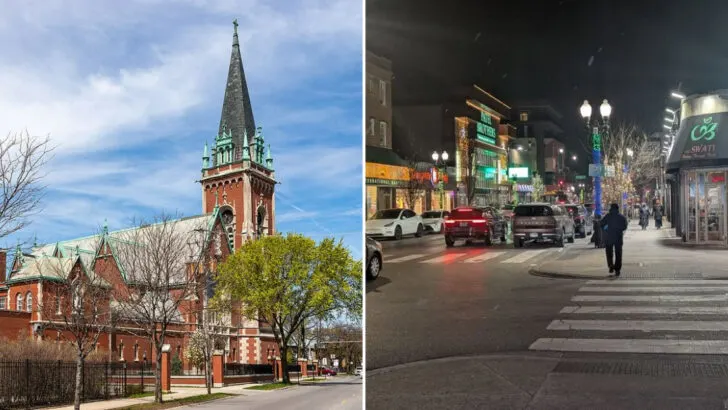Flagstaff, Arizona might sit under the ponderosas, but travelers there often crave cultural corridors that pulse with flavor and community. Chicago’s Devon Avenue delivers exactly that: a compact stretch where scents of spice mingle with multilingual storefronts and steady weekday foot traffic. It’s a living main street, dense with food, shopping, and services that echo across the South Asian diaspora. If you’re curious how a single avenue can feel like a journey across continents, Devon is your next stop.
What makes Devon Avenue a South Asian corridor
Devon Avenue on Chicago’s North Side compresses a vast South Asian world into a few lively blocks. Storefront signs mingle English with Hindi, Urdu, and Gujarati, signaling a corridor shaped by food, shopping, and services. Weekday foot traffic is steady: aunties comparing spice prices, students grabbing snacks, and families running errands. Restaurants, sari shops, and grocers sit shoulder-to-shoulder with travel agents and clinics. Many visitors call it “Little India,” yet it’s broader—Pakistani, Bangladeshi, Nepali, and Sri Lankan influences thrive too. The result is a vibrant, practical main street that doubles as a cultural classroom and community anchor.
Street food & restaurants — from chaat counters to tandoors
Devon’s eating rhythm begins early, with bakeries turning out savory pastries before commuters arrive. By late morning, chaat counters assemble pani puri, bhel, and dahi puri, while dosa griddles hiss with fermented batter. Lunchtime lines form at beloved counters where office workers order thalis and kebab rolls. Casual curry houses encourage family-style sharing—naan baskets, biryani mounded high, tandoori platters bright with char. In the afternoon lull, tea and samosas reset appetites. Evenings stretch into leisurely dinners where regional menus—Punjabi, Gujarati, Hyderabadi, Goan—invite discovery. Quick bite or sit-down feast, Devon’s kitchens map the subcontinent deliciously.
Sweet shops and bakeries — jalebi, barfi, and chai stops
Sweets are daily ritual and festival centerpiece on Devon. Confectioners display spirals of syrupy jalebi, creamy barfi cut into diamonds, and laddoos dusted with pistachio. Glass cases often hide savory treats too—rows of samosas and kachoris ready for quick snacks. Pair a hot chai with a warm pastry to watch neighborhood life flow by. Shoppers pick up decorative boxes of mithai for birthdays, pujas, and Eid gatherings. Many bakeries bake throughout the day, so freshness is reliable. Ask for seasonal specialties or regional favorites; staff usually offer tasting suggestions with pride and practical guidance.
Grocery aisles and spice shops — the pantry of many cultures
Devon’s grocers compress a pantry of the subcontinent into narrow aisles. You’ll find bulk sacks of basmati and sona masoori rice, multiple lentil varieties, and fresh curry leaves next to fenugreek and mustard seeds. Labels toggle between English, Hindi, Urdu, Bengali, and Tamil, hinting at culinary diversity. Ghee tins, jaggery blocks, and pickles line up by region, while freezer cases hold parathas and idli batter. Spice shops grind masalas on-site, and clerks recommend blends for homemade chaat or kebabs. It’s practical shopping and an education: ingredients become a map of families’ kitchens across South Asia.
Clothing, wedding, and textile shops — saris, kurtas, and tailoring
Clothing stores on Devon shimmer with embroidered saris, sherwanis, and kurtas, catering to weddings, festivals, and everyday wear. Shopfronts hang vivid fabric swatches that flutter like flags, inviting a closer look at zari work and beadwork. Inside, staff pull options by color, drape, and budget, while small tailoring shops promise quick fittings and last-minute hems. Bridal consultations unfold beside racks of dupattas and juttis. Seasonal collections arrive before Navratri and wedding season, turning the avenue into a runway of tradition and trend. Even browsing offers a tactile tour of textiles from across the subcontinent.
Religious and community anchors — temples, gurdwaras, and centers
Devon’s spiritual and civic life rests in its temples, gurdwaras, and community centers. These spaces host language classes, health clinics, food drives, and legal aid days, keeping the corridor active beyond shopping hours. On festival days, processions move along the avenue, volunteers organize donation tables, and community kitchens serve generous plates. Regular programs—youth tutoring, dance rehearsals, devotional music—build intergenerational ties. Visitors are welcome with basic etiquette: modest dress, shoes off where required, and quiet attentiveness. These anchors turn the street into a year-round gathering place, reinforcing social safety nets and shared cultural memory.
Services that matter — travel agents, remittance shops, and medical practitioners
Devon’s storefronts tell practical stories: flight specials to Karachi and Kolkata share windows with bold money-transfer rates, while appointment cards for clinic interpreters sit near salon lookbooks. Travel agents bundle visas, itinerary planning, and airline changes in multiple languages, easing long-distance family logistics. Remittance counters keep cash flowing across oceans, often open late after work. Language-access clinics help elders navigate referrals, prescriptions, and insurance. Salons bridge everyday trims and elaborate wedding prep in regional styles. Together, these businesses soften the edges of migration—solving problems, saving time, and honoring cultural preferences, all within a few walkable blocks.
Rohingya and other newer communities — evolving layers of arrival
Devon keeps adding threads: Rohingya refugees and other newer South Asian groups have opened groceries, halal eateries, tutoring hubs, and cultural outreach programs. Community centers now host citizenship workshops, trauma-informed counseling, women’s sewing circles, and youth soccer sign-ups. Signs in Rohingya, Burmese, Urdu, and Bengali appear alongside Gujarati and Hindi, widening the corridor’s linguistic map. Friday food distributions, weekend literacy classes, and health fairs fold into everyday routines. These additions don’t replace older anchors; they sit beside them, expanding choice and belonging. The result is a living archive—where each arrival leaves services, memories, and rhythms for the next.
How to experience Devon in a day — a short walking route
Start early with a creamy karak chai and a flaky pastry at a corner café; listen to the swirl of languages deciding the day. Stroll to a spice merchant to inhale cardamom and asafoetida, then pop into a clothing shop to feel fabric weights and browse wedding hues. Break for lunch at a family-run spot—order a thali or biryani and ask about regional specials. Continue to a sweets counter for boxed mithai. End with a quiet stop at a temple or community center. The compact loop rewards slow observation: smell, color, conversation—anchored by short, sensory-focused pauses.
Practical tips — timing, transit, and respectful visiting
Visit on weekday mornings or early afternoons to feel everyday rhythms and avoid the busiest weekend crowds. Metered street parking fills quickly; read curb signs carefully and consider side streets. For public transit, check the 155 bus and nearby routes, which drop you a short walk from major clusters. Dress modestly if you’ll enter places of worship, remove shoes when required, and keep voices low around prayers. Ask before photographing people or interiors. Bargaining is gentle—be polite, smile, and accept firm prices. Bring small bills for tips and small purchases. Leave time to linger; Devon rewards unhurried curiosity.

